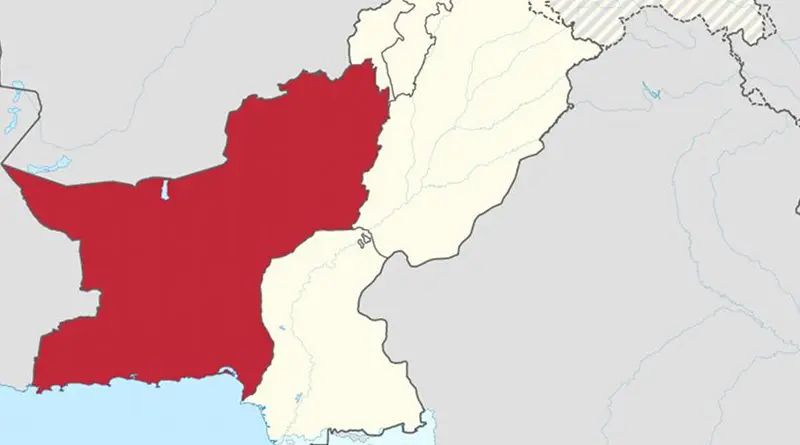Balochistan: Contextualising The Recent Spike In Attacks – Analysis
By IPCS
By Anwar Ali Tsarpa *
On 23 November 2018, a Baloch insurgent group, the Balochistan Liberation Army (BLA) attacked the Chinese consulate in Karachi, Pakistan. In a statement, the BLA said the “objective of the attack was to highlight Chinese exploitative designs to the world.”
The attack on the Chinese consulate took place merely two weeks after the mastermind of the attack, Aslam Baloch, initiated the formation of the Baloch Raaji Ajoi e Sangar (BRAS), a united front of Baloch insurgent groups, namely the Baloch Liberation Army, the Balochistan Liberation Front, and Baloch Republican Guards. Subsequently, on 14 December 2018, BRAS also carried out a major attack on Pakistani forces in the Tagran area of Balochistan province’s Turbat district. Some other smaller scale attacks on security forces too were reported in the meantime, indicative of a spike in insurgent activity.
These recent attacks could be viewed as an outcome of China’s failure to convince the groups to negotiate. Ever since the China Pakistan Economic Corridor (CPEC) has been in the works, Beijing has made clandestine attempts to negotiate with Baloch insurgent groups to ensure security for the US$ 60 billion project. The recent Beijing-led attempt to initiate negotiations did not succeed probably because of the groups’ scepticism regarding how the post-negotiation period would pan out. The issue of ‘breach of trust’ is a major concern that looms large in Baloch insurgents’ minds. This phenomenon is a result of historical memory arising from experiences such as the execution of surrendered insurgents by the Pakistani state in post-settlement period of the first (1948) and second (1959) phases of the insurgency.
Days before he was killed in a suicide attack in Afghanistan on 25 December 2018, Aslam Baloch had described the “partnering” between China and Pakistan as a “challenge” to “the future of the Baloch people,” and flagged the “outnumbering” of indigenous Baloch population by outsiders as a concern. It is true that the general Baloch population has been facing economic, socio-cultural and political marginalisation since independence. However, in today’s situation, the disenchantment borne out of the discrimination and marginalisation is compounded by fears of demographic change and loss of land due to the ongoing land acquisition related activities in Balochistan.
To illustrate, Balochistan’s port city of Gwadar is a rapidly growing urban centre. Gwadar is a key component in the CPEC, and recent development activities in the area have involved extensive land acquisition. For instance, thousands of acres of land have been acquired by the Pakistani navy and land grabbers, through uneven means around the Kalmat Khor lagoon, among others. As a result, the livelihoods of local fishermen, who comprise 80 per cent of the total population of 185,000, have been affected. According to media reports citing official documents, a range of ministries, and state-run defence sector institutions and departments are collectively seeking over 60,000 acres of land for them in different the area.
Given the scale of the Gwadar port project and CPEC, local fishermen fear that after the infrastructure is developed, they would not be allowed to enter the sea. Additionally, their grievances also stem from the fear that the local population would not benefit from development projects. In the past, such as in the Saindak Copper Gold Project and the Sui gas field project, the federal government gave only a meagre share of profits to the Balochistan provincial government. In the case of the Gwadar port project too, China is set to receive 91 per cent of the profits for the next 40 years. Past experiences of marginalisation have caused a severe trust deficit in case of ongoing Chinese-led development projects as well.
Meanwhile, in the aftermath of the failed talks, incidents of forced disappearances of Baloch persons have risen in the province. A judicial “Commission of Inquiry on Enforced Disappearance” has recorded 84 cases of forceful disappearance as of end of October 2018. According to the government of Pakistan, there are 5507 alleged victims of forceful abduction, but the actual numbers are estimated to be much higher.
It is possible that Baloch insurgent groups have increased attacks on Pakistani security forces also as retaliation to the sudden upsurge in the instances of forced disappearances of locals through October and November 2018. It remains to be seen whether the recent spate of attacks escalate or abate. A lot depends on the availability of arms and the will of the groups. Significantly, it also depends on the state’s counter-insurgency approach and the manner in which the state addresses local grievances.
*Anwar Ali Tsarpa is a Research Scholar at the Nelson Mandela Center for Peace and Conflict Resolution at Jamia Millia Islamia University, New Delhi.

